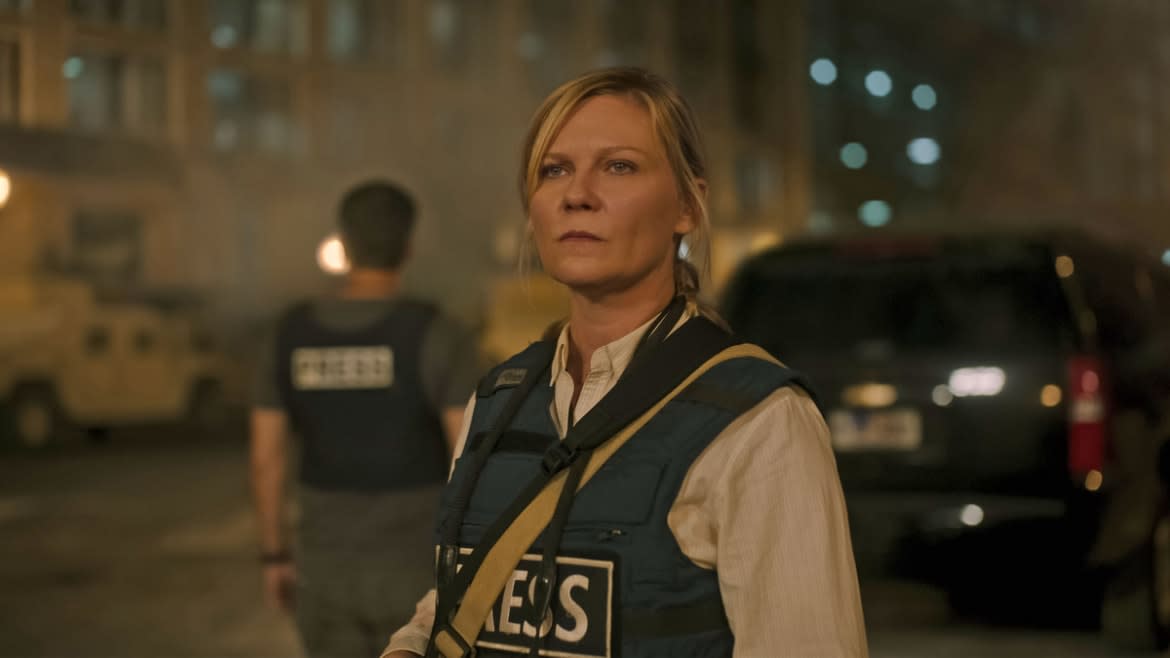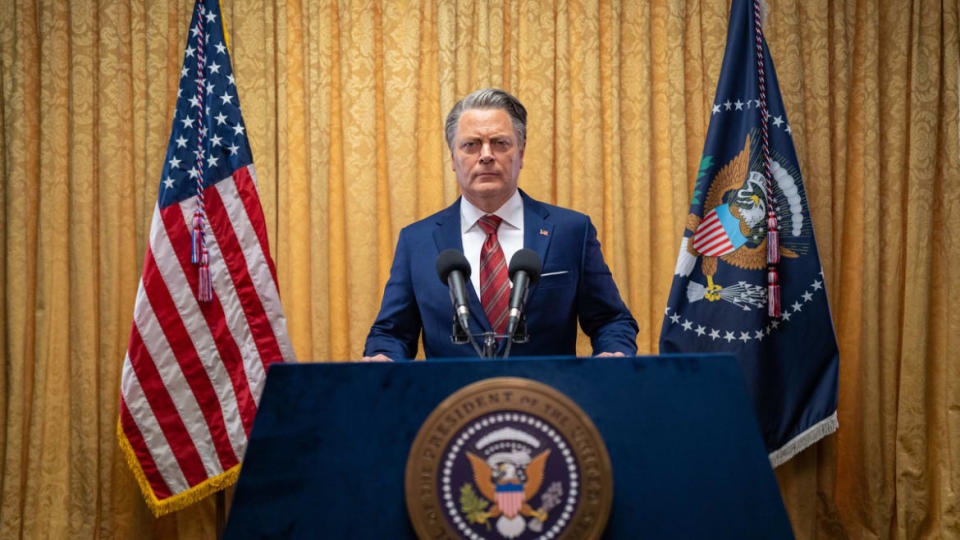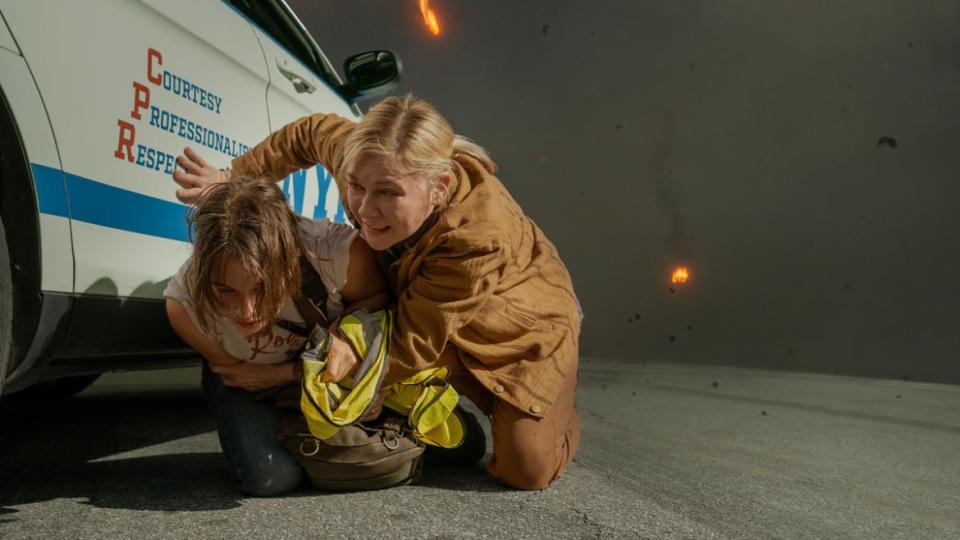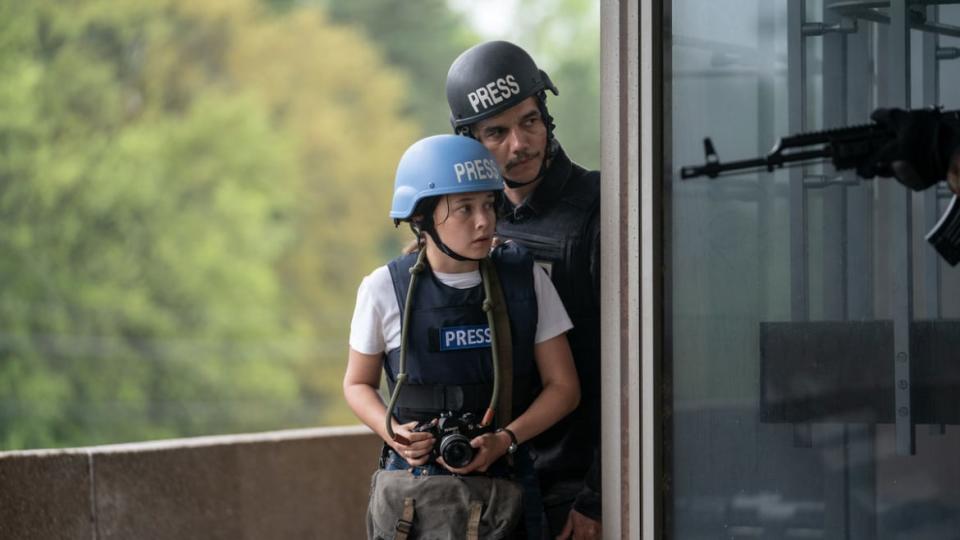Alex Garland’s ‘Civil War’ Is an Explosive Warning Against a Trump Takeover

- Oops!Something went wrong.Please try again later.
American democracy seems to be teetering on the brink of collapse, and writer/director Alex Garland exploits that feeling for unbearably despairing suspense and censure with Civil War, a vision of a near-future in which the United States is no longer united. Less interested in devising one-to-one parallels with our present than with laying bare the catastrophic consequences of the division, hatred, and apathy that currently run amok from coast to coast, the Annihilation and Men auteur’s latest, in theaters April 12, is a portrait of individual and societal breakdown that plays like a companion piece to his 28 Days Later, except that this time around the vicious monsters are all of us. Spearheaded by a poignant Kirsten Dunst performance, and rife with harrowing, pulse-pounding set pieces, it’s a towering genre film about a not-so-fanciful end times—one that both understands, and proves, the peerless power of the visual image.
In a New York hotel room, acclaimed war photographer Lee (Kirsten Dunst) watches the country’s president (Nick Offerman) proclaim, not very convincingly, that a great government victory over the secessionist Western Forces campaign led by California and Texas is on the horizon. Outside, explosions boom, and as she lies in a bathtub, her face in her hands, Lee recalls some of the numerous unforgettable examples of man’s cruelty from her globe-trotting career. What once was distant and foreign, however, is now commonplace at home, as is reinforced when she and her journalist partner Joel (Wagner Moura) cover a city event that turns fatal, and which compels Lee to instinctively save the life of Jessie (Cailee Spaeny), an aspiring photojournalist whose naivete is a grave threat to her safety.
In a reporter-inundated lobby, Lee and Joel are cajoled by colleague Sammy (Stephen McKinley Henderson) into confessing the nature of their next mission: They plan to travel to Washington, D.C., to attempt to interview the commander-in-chief before he’s unceremoniously deposed by the gaining-traction insurrectionists. Sammy tells them that this means certain death, since the destabilized government is killing visitors on sight (including journalists, who are viewed as collaborators). Nonetheless, he too is enticed by the promise of such an unparalleled scoop, and he persuades them to let him join their party. This rankles Lee, whose jadedness knows no bounds, and on the morning of their departure, she’s further angered by Joel’s decision to allow Jessie (an avowed Lee fan) to also tag along, thus adding a babysitting element to their already perilous journey.
Because Philadelphia is a no-go zone, Lee and company embark on a circuitous route that takes them to the capital by way of Pittsburgh, West Virginia, and the “front lines” of Charlottesville. That city’s key role in this story is one of many instances—like the revelation that Offerman’s leader is in his third term and has dissolved the FBI—in which Civil War alludes to today without drawing direct comparisons. Nonetheless, the specter of a forthcoming Trumpian takeover and the bedlam it might inspire is everywhere in Garland’s film, and the subtlety with which the writer/director evokes connections between his make-believe nightmare and a possible real-life one lends the material its haunting terror. So too does the authenticity with which he stages his action; from a showdown with a sniper to an all-out battle in the streets of D.C., the proceedings present a disturbingly recognizable world in which everything—people, structures, dreams, ambitions, and loyalties—is fragile, and constantly at the mercy of explosive, uncontrollable forces.

Nick Offerman
On the road, Lee, Joel, Sammy, and Jessie endure one psyche-scarring ordeal after another, and Civil War’s myriad conflicts—between freedom and tyranny, order and chaos, love and hate, sanity and madness—are reflected in the tortured visages of its characters: Lee, haggard and desolate; Joel, giddy from adrenaline and irreparably bereft; Sammy, cautious and forlorn; and Jessie, frightened and hungry. Having seen how little her past work did to stave off domestic disaster, Lee has apparently lost faith in photographs’ ability to effect change. Yet just as she soldiers onward in search of the snapshot that might, somehow, end this insanity (and assuage her battered soul), Garland’s film delivers blistering compositions that rattle the nerves and pain the heart. Awash in close-ups set to cacophonous noise or, more affecting still, deafening silence, it makes its case for the urgency of our contemporary predicament via unforgettable vistas of America under siege and in ruins.

Cailee Spaeny and Kirsten Dunst
Between its intimate and empathetic portraits of its subjects’ faces, and its intense and insistent handheld cinematography (courtesy of Rob Hardy), Civil War embeds us, body and spirit, in the thick of this turmoil, such that Joel’s ecstasy and Lee’s agony become our own—often simultaneously. Their odyssey interrupted by brief moments of levity and calm (say, at a stadium refuge where families are temporarily sheltered from the raging storm outside), Lee and the rest are both players in this drama and witnesses to it, and Garland draws us so closely to them that it’s impossible not to feel invested in their (and America’s) plight. Even in a suburban enclave that appears detached from the consuming unrest, or in a forest that burns beautifully in the night, nothing remains truly unscathed. In that regard, the film resounds as a warning about our vulnerability to autocrats, to fanatics, to violence, and to complacent confidence in the idea that our systems, values and compassionate ideals will carry the day.

Cailee Spaeny and Wagner Moura
Civil War’s shattering centerpiece involves the journalists’ encounter with a troupe of militia psychos (led by Jesse Plemons) whose allegiance is as hazy as all those who roam this wasteland; as another soldier informs Joel, everyone is simply a “target.” When democracy dies, Garland suggests, anarchy is sure to reign. Plumbing ongoing national fears by lacing his action with the viruses that infect our body politic—from tribalism, xenophobia and racism to class resentments, petty jealousies, and revolutionary zealotry—the writer/director captures the sad, volatile ugliness of the here and now by examining it from an askew angle. Moreover, he conveys the tragedy of it all in the agonized countenance of Dunst, which exudes a weariness and sorrow that’s so profoundly inconsolable that it can only be relieved in one way, and which confirms (like Civil War itself) that, at their best, pictures don’t just speak louder than words—they scream.
Get the Daily Beast's biggest scoops and scandals delivered right to your inbox. Sign up now.
Stay informed and gain unlimited access to the Daily Beast's unmatched reporting. Subscribe now.

